- Home
- Peter Ackroyd
Chatterton Page 17
Chatterton Read online
Page 17
Or so at least it seemed to Harriet Scrope, who replied ‘I say! I say!’
‘Harriet?’
‘Yes, what is it?’
Charles was very relaxed now. ‘No. I think you were calling me.’
‘Well, that is a coincidence.’ Harriet was standing on one leg while with the other she kicked out at Mr Gaskell, who was about to spring upon a side-table covered with what Harriet called her ‘knick-knacks’.
‘Isn’t it a lovely day, Harriet? April with his showers sweet.’
‘Get off it!’ Harriet was addressing the cat.
‘It is. Really.’
‘I know it is.’ She tried to explain. ‘I was just talking to Mr Gaskell.’
‘Did he tell you about it?’
Harriet gave a loud laugh, but she stopped very suddenly. ‘I wanted to talk to you, Charles dear.’ She hesitated; she was not sure whether she ought to admit having seen Vivien the day before, especially since she was about to act upon their conversation. ‘I think we ought to rest on our laurels for a while. The memoirs can wait, don’t you think? We’re both a little bit tired.’
‘Tired?’
‘Yes, you know, weary, exhausted, bushed, clapped out, fucked.’ Then she added: ‘Of course I’ll still pay you.’
Charles was so delighted by his sudden ability to write about Chatterton (for the last few days he had done nothing except stare out of the window or sleep) that he was hardly listening to her. ‘That’s entirely up to you, Harriet.’
‘Yes, I suppose it is.’ She hesitated again. ‘How’s Chatterton?’
‘As a matter of fact ’ Charles was smiling at Edward who, hearing a change in his father’s voice, had come back into the room. He beckoned his son over and placed an arm around his shoulder as he continued talking to Harriet. ‘As a matter of fact, I’m planning a celebration. I’ve almost started. Spinach. Finished. I’ve almost finished.’ He hugged Edward tighter as his son tried to break free.
‘That is good news.’
‘I was thinking of dinner at the local Indian. Friday week.’
‘I’ll be there. I adore hot things.’ Harriet stuck out her tongue in disgust. ‘I like them to burn me.’
Edward had struggled free of his father’s embrace and, sensing his excitement, was marching around the room and shouting ‘Friday the thirteenth! Friday the thirteenth!’ But he became silent when Charles, having put down the telephone and returned to his desk, groaned softly to himself. The words which he had inscribed deeply into the page had already faded, leaving only a few hollows and striations behind; all of his thoughts about Chatterton had disappeared. With deliberate slowness he opened a drawer and took out another pen; very carefully he placed a fresh sheet of paper on top of his desk; calmly he settled himself in his chair; and all the time he was trying to remember what it was that he had written before. ‘Chatterton,’ he wrote; and then he stopped. Children were playing in the street outside, and they shouted out small words which rose towards the sun. The old house trembled beneath its own weight.
When Charles looked up he saw Edward standing by his desk; he must have slept again. ‘Hi, kid. What’s the problem?’
For a moment neither of them spoke. ‘Let’s go out, Dad.’ He held his arms stiffly down by his sides, and then solemnly repeated a phrase he had often heard his mother use. ‘We need some fresh air.’ He marched back into his room, and Charles followed him; it was then that he saw Chatterton lying on the bed.
After the first moment of blank fear he realised that it was the portrait of Chatterton: Edward must have removed it from behind his desk as he slept, and placed it here at the top of the bed. He was about to retrieve it when his son put out his hand to stop him. ‘I wanted him to fall asleep,’ he said.
Charles was genuinely interested by this. ‘Why must he fall asleep?’
‘Because he was staring at you.’
‘And how do you know that?’
‘Can’t you see?’ Edward pointed at the portrait, and for a moment Charles was alarmed. ‘Can’t you see he’s trying to hurt you?’
Charles went over to the canvas, and turned it to the wall. ‘He can’t hurt me. He’s dead.’
‘How do you know, Dad?’ Edward spoke slowly, as if his father was a child whom he had to convince with very clear arguments. ‘He’s alive in the picture, isn’t he?’
‘Seeing is believing,’ Charles said, almost to himself. He seized Edward’s hand. ‘I’ll tell you what. I’ll make a deal with you: if I showed you a picture of him dead, would you believe that?’
Edward hesitated, suspecting that this was a trick question. ‘I might do.’
‘Come on. Make a deal.’ His father was very insistent. ‘Would you believe he was really dead?’
Edward looked at the canvas and then back at his father. ‘Okay.’
‘All right then, Edward the Uncertain, we’re going on a journey.’
‘No, it’s true. Your hair can stand on end, Eddie.’ They were holding a serious discussion on the top deck of the bus which was taking them towards the Tate Gallery. ‘When you’re afraid, the little muscles on the hair-root contract. And then the hair stands up. Look. I’ll show you.’ Charles screwed up his eyes, trying by an effort of will to raise his hair; and, in fact, he could feel his scalp quivering with the strain. But then there was some larger disturbance beneath his skull, and he leaned back quickly against his seat.
‘You did it!’ Edward was very excited. ‘You made your hair stand on end!’ They were approaching the river from Oakley Street and, as the bus turned the corner onto the Chelsea Embankment, Edward pressed his face against the grimy window. ‘Look at that bridge, Dad! It’s moving!’ There was a strong wind, and the Albert Bridge was swaying slightly between its two banks. ‘How can that be safe?’
And Charles himself was aware how fragile it seemed: it looked to him to be on the point of collapse, ready to crack or break beneath the strain, and he had a sudden image of the cars and pedestrians falling helplessly into the water. ‘Don’t be silly,’ he said. ‘Of course it’s safe. Nothing can happen.’
He looked around, almost apologetically, at a young man who was sitting across from them. He was wearing an olive green jacket and a pair of flared brown trousers: old, frayed clothes which hung so awkwardly on him that it looked as if he had been dressed by someone else. He had lank hair, and his eyes protruded slightly so that he gave the impression of being in a state of permanent surprise or shock. He seemed to be smiling at some private joke but then, noticing Edward’s interest in the bridge, he said, ‘You know when that was built, don’t you?’ Edward shook his head. ‘In 1873. There are four hundred separate pieces of ironwork on that bridge, and each piece was made at Boulter’s Foundry in Birmingham. It took two years to finish and it cost seventy thousand pounds.’ He seemed to take as much delight in imparting this knowledge as he did in possessing it. ‘It was part of the great improvement. You know, there was a time when all this was just wasteland. The poor people came here and searched for coal or wood. They needed fires, you see.’ He had a curious, engaging smile but Charles noticed how nervously he pulled at his frayed cuffs as he spoke. ‘And the river banks were just mud, although the very poor still lived here somehow. We should count our blessings, shouldn’t we?’ He looked earnestly at them both. This is my stop. Goodbye.’
‘I hope we see you again,’ Charles said. When the bus pulled away he watched as the young man, in his shabby, ill-fitting clothes, started walking towards a block of council flats beside the river.
‘That man knew a lot of history didn’t he, Dad?’
‘Yes, he did.’ And he saw at once how he must have looked out at that bridge all his life. ‘Some people like history.’ Then, to his son’s embarrassment, he put his arm around Edward and hugged him. ‘It’s cosy up here, isn’t it? It’s like being on a plane above the clouds.’ He was about to say something else when he saw the Tate Gallery approaching on the left. ‘Come on, Eddie! No more daydreami
ng.’ He jumped up enthusiastically. ‘We’re here.’
But when they reached the steps of the gallery Charles held back: he seemed reluctant to enter the building until Edward put his hands against his back and pushed him upwards. As soon as they walked into the front hall, however, Charles knew the way. ‘Now,’ he said. ‘We have to get through the nineteenth century first.’ Edward did not know what he meant but he followed his father into the first gallery; crooked streets of whitewashed houses with pink blinds and grey roofs stretched away from him on the right side, and on the left purple and emerald landscapes glowed upon the wall. In front of him he could see the interiors of small rooms, some of them looking out onto gardens where the flowers seemed to breathe colour into the air; and when he turned suddenly he saw the shimmering surface of a lake quietly reflecting the evening light. Charles had turned a corner and he hurried to catch up with him, his shoes squeaking on the green marbled floor. His father was standing in the middle of a gallery filled with much larger paintings and Edward took his hand as the prospect of gorges, ravines, abysses and wild oceans surrounded the man and boy. ‘Is this it, Dad?’ he whispered.
‘No, not really.’ Charles turned slowly, absorbed by these images of extinction. The violent colours seemed to be detaching themselves from the canvas and floating towards him. ‘No. We have to go further back.’
‘Go back?’
‘We want Chatterton.’
But Charles made no effort to move away; he stood there, gazing at the paintings, as Edward left his side and walked up to an attendant. ‘Please could you tell me about Chatterton?’
The attendant looked down at the thoughtful, anxious child. That’s a painting, isn’t it?’
‘I think so.’
He called over to a colleague, lounging against a door. ‘Chatterton?’ And he in turn shouted to another, ‘Chatterton?’, until the question echoed around the white walls. And, when the answer came, Edward was directed to Gallery Fifteen down the right-hand side, fourth on the left. And he went back for his father, taking him by the hand once again and leading him forward.
They passed through an exhibition of portraits, and in the first room of modern acquisitions Charles noticed large human figures in various brooding or unquiet configurations, some of them carrying heavy burdens and some of them sitting dejected. In the next room he saw eighteenth century portraits in which solid, complete figures dominated the landscape like trees; in the third room there were seventeenth century faces, looking out from dark corners of panelled interiors or smiling in the shadows. Charles could see in each face the life and the history; he did not want to leave the world in which his own face was their companion.
They had reached Gallery Fifteen, and Edward turned around to see his father hesitating. ‘Come on, Dad. This is our one.’ Charles took a deep breath and then walked quickly past him; he did not glance at the other canvases but went straight up to a painting hanging on the far wall. When Edward joined him, he saw a man lying down upon a bed with one arm trailing upon the floor.
‘There it is.’ His father bent down and whispered to him. ‘Do you believe me now?’ He pointed at the title beneath the canvas, ‘Chatterton. By Henry Wallis .1856.’
But Charles himself did not want to look at the actual body, not yet. Instead he looked out of the window of the garret in Brooke Street, towards the smoking rooftops of London; he examined the small plant upon the sill, with its thin translucent leaves curling slightly in the cold air; he saw the burnt-out candle on the table, and his eye travelled upward along the path of its fading smoke; he turned his head slightly towards the wooden chest, lying open, and then he started to count the torn pieces of paper which lay scattered across the boards of the floor. And, at last, he looked at Thomas Chatterton.
But was there someone now standing at the foot of the bed, casting a shadow over the body of the poet? And Charles was lying there, with his left hand clenched tightly on his chest and his right arm trailing upon the floor. He could feel the breeze from the open window upon his face, and he opened his eyes. He was able to look up and, her face in shadow beside the garret window, he saw Vivien standing above him. She was crying.
‘That’s not our face,’ Edward was saying. ‘Our face is different!’
‘Oh no.’ Charles was swaying slightly, and he held onto his son’s shoulder for support. He was finding it difficult to breathe, and for a moment he could not speak. ‘Oh no. That’s George Meredith. He was the model. He was pretending to be Chatterton.’
‘So he’s not dead yet!’ Edward was triumphant. ‘Chatterton isn’t dead! I was right!’
‘No,’ Charles said softly. ‘He’s not dead yet.’
‘You like not that French novel? Tell me why.
You think it most unnatural…
Unnatural? My dear, these things are life: And life, they say, is worthy of the Muse.’
(Modern Love. Sonnet 25. George Meredith.)
‘How can it be unnatural?’ Meredith took out a handkerchief from the pocket of his lilac trousers, and draped it across his face. His voice was slightly muffled by the cloth. ‘Now you can see the common features of mankind, free from individual expression. So how can a mask be unnatural?’
‘But I want you as a model. Yourself. Your face. ‘Wallis blinked as the winter sunlight flooded the room, and the enamelled Chinese vases suddenly caught fire on the mantelpiece.
‘My face, but not myself. I am to be Thomas Chatterton, not George Meredith.’
‘But it will be you. After all, I can only paint what I see.’ Wallis looked around for support to Mary Ellen Meredith, but for a moment she seemed abstracted; she was examining her palm as she clenched and unclenched her right hand.
Meredith laughed and raised himself from the sofa on which he had been lounging. ‘And what do you see? The real? The ideal? How do you know the difference?’ The two men had been debating like this all afternoon and, much to Mary Ellen’s annoyance, her husband would not let the argument rest. ‘When Moličre created Tartuffe, the French nation suddenly found him beside every domestic hearth. When Shakespeare invented Romeo and Juliet, the whole world discovered how to love. Where is the reality there?’
‘So this is how you see your own poetry, I take it?’ Even as Wallis said this he could not help but glance again at Mary: with the light upon her hair, her cheek, her shoulder, she seemed to him to resemble a Giotto, whose paintings he had just been studying in Tournier’s History.
‘Not at all. I don’t aim so high. I can only lay claim to a small enclosed room, a little narrow space of observation where I set my pen. Of course there is a reality ’
‘Ah! The tune has changed!’
‘ But, I was going to add, it is not one that can be depicted. There are no words to stamp the indefinite thing. The horizon.’ Meredith stretched out on the sofa again, and seemed to scrutinise his wife.
Briefly she returned his look. ‘My husband thinks more of his poetry than he will tell us, Mr Wallis. He is very proud.’
‘Yes, Wallis, why don’t you paint that? Pride Dying in a Garret. It would be worthy of the Royal Academy. Or you could place it there, beside the other true fictions.’ Meredith was pointing towards an ebony bookcase, already decorated with groups from Chaucer, Boccaccio and Shakespeare. ‘I must work before it gets dark.’
Mary got up from her chair, and the rich blue colouring of her dress swirled around her as if she were some goddess rising from the Mediterranean sea. ‘You must walk Mr Wallis to the stand. George. He will lose his way in this fog.’
‘What fog is that, my dear?’
She rang for a servant to bring Wallis his ulster and, while they waited, Meredith was capering on the carpet behind them; he was lunging at his friend’s back with an invisible sword. ‘I will put him at a stand,’ he said. Take that, and that, and that.’
The two men left the house in Frith Street and, as they walked slowly towards the cab stand, Wallis noticed how Meredith lost his artificial mann
er when he was no longer in the presence of his wife. He was talking about some paintings from the Nazarene School, which he had seen in the St James’s Gallery the day before, and Wallis was impressed by his enthusiasm. ‘I like details,’ Meredith was saying as they turned into Soho Square. ‘I detest the grand effect, unless it springs from small things. The Stanfields and the Maclises are mere theatre, mere Dickens on canvas.’ The rays of the setting sun touched for the last time the warm bark of the trees which stood in the Square, and the light brushed against the grey stone of the houses around it. There was a vague fog in the air, but it seemed only to broaden the light as if its milky veins were spreading outward and turning into smoke. Two high window panes glittered, and Meredith pointed towards them: ‘Is that what you call electro-typing?’
Wallis’s thoughts had been elsewhere, and it was only with an effort that he understood his friend’s remark. ‘It has quite a Cuyp effect, doesn’t it?’ They walked on in silence for a moment until Wallis added, ‘You see how the twilight makes all the colours fade into one another.’ He pointed towards a piece of wrapping paper which was blowing among the trees: ‘Only blue and white can keep their luminosity in this light.’
‘Yes, dear Henry, everything fades.’ Meredith’s sepulchral tone made them both laugh, but then he added in the same mournful voice, ‘And no doubt it is true that we see nature through the eyes of the painter.’
‘Only if you are content to be a copyist. But look.’ He took Meredith’s arm and crossed the square. ‘Do you see how the light becomes blue as it is filtered through the leaves? No one has caught that effect before on canvas. Put it in a poem, George, and it will be yours.’

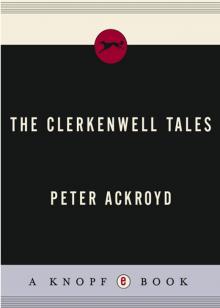 The Clerkenwell Tales
The Clerkenwell Tales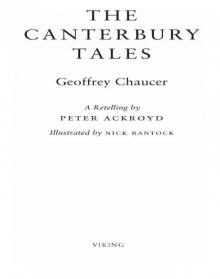 The Canterbury Tales
The Canterbury Tales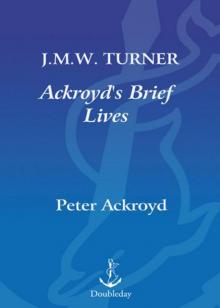 J. M. W. Turner
J. M. W. Turner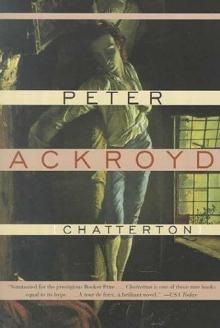 Chatterton
Chatterton The Canterbury Tales – A Retelling
The Canterbury Tales – A Retelling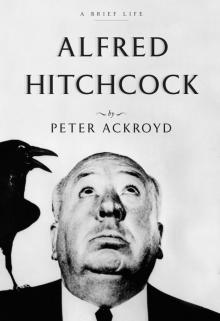 Alfred Hitchcock
Alfred Hitchcock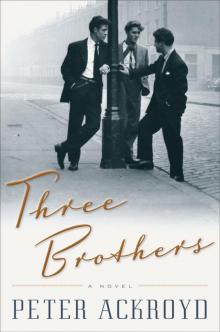 Three Brothers
Three Brothers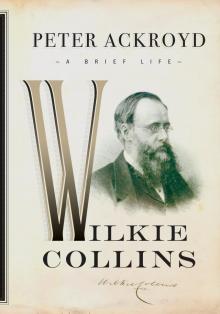 Wilkie Collins
Wilkie Collins Venice
Venice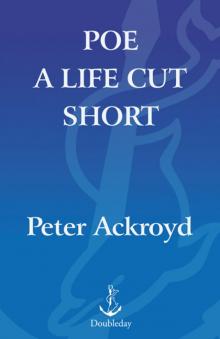 Poe
Poe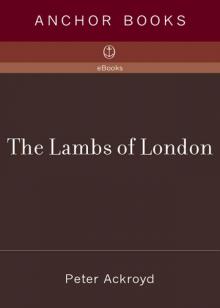 The Lambs of London
The Lambs of London London
London Queer City
Queer City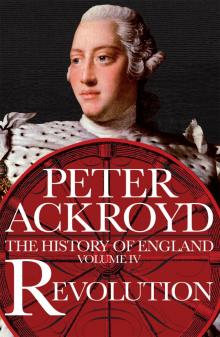 Revolution, a History of England, Volume 4
Revolution, a History of England, Volume 4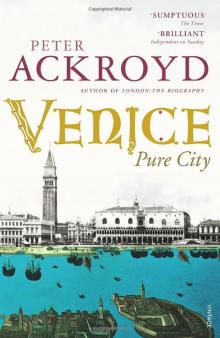 Venice: Pure City
Venice: Pure City Foundation
Foundation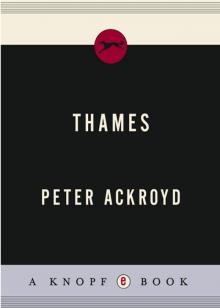 Thames
Thames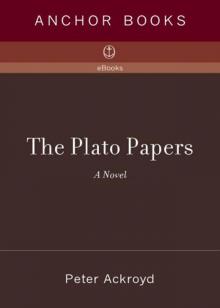 The Plato Papers
The Plato Papers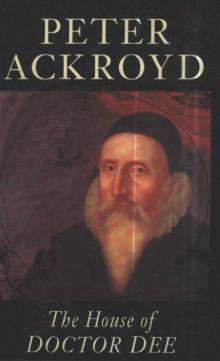 The house of Doctor Dee
The house of Doctor Dee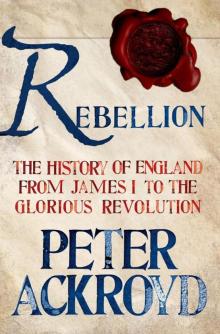 Rebellion: The History of England from James I to the Glorious Revolution
Rebellion: The History of England from James I to the Glorious Revolution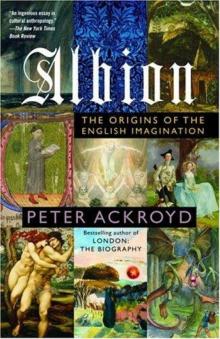 Albion: The Origins of the English Imagination
Albion: The Origins of the English Imagination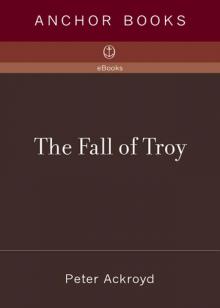 The Fall of Troy
The Fall of Troy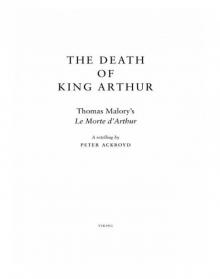 The Death of King Arthur
The Death of King Arthur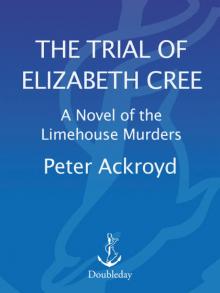 The Trial of Elizabeth Cree
The Trial of Elizabeth Cree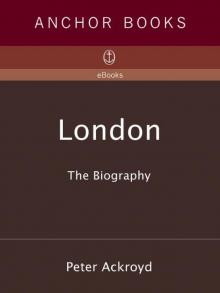 London: The Biography
London: The Biography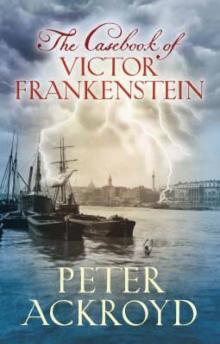 The Casebook of Victor Frankenstein
The Casebook of Victor Frankenstein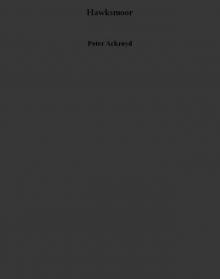 Hawksmoor
Hawksmoor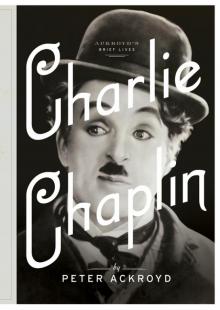 Charlie Chaplin
Charlie Chaplin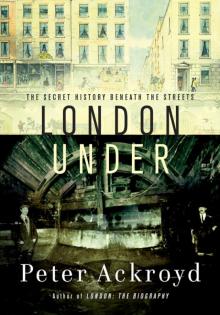 London Under
London Under